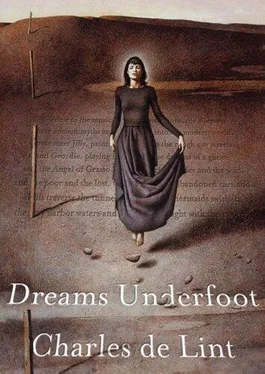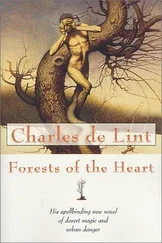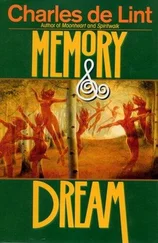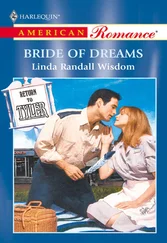One day in late April, she was leaning on the handlebars of her tenspeed in front of the public library in Lower Crowsea, admiring the yellow splash the daffodils made against the building’s grey stone walls, when she sensed, more than saw, a red bicycle pull up onto the sidewalk behind her. She turned around to find herself looking into the conjure man’s merry features.
“It’s spring, isn’t it just,” the conjure man said. “A time to finally forget the cold and bluster and think of summer. John can feel the leaf buds stir, the flowers blossoming. There’s a grand smile in the air for all the growing.”
Wendy gave Ginger a pat, before letting her gaze meet the blue shock of his eyes.
“What about a Tree of Tales?” she asked. “Can you feel her growing?”
The conjure man gave her a wide smile. “Especially her.” He paused to adjust the brim of his hat, then gave her a sly look. “Your man Stanhold,” he added. “Now there was a fine poet—and a fine storyteller.”
Wendy didn’t bother to ask how he knew of her plan. She just returned the conjure man’s smile and then asked, “Do you have a story to tell me?”
The conjure man polished one of the buttons of his bright blue jacket.
“I believe I do,” he said. He patted the brown satchel that rode on his back carrier. “John has a thermos filled with the very best tea, right here in his bag. Why don’t we find ourselves a comfortable place to sit and he’ll tell you how he got this bicycle of his over a hot cuppa.”
He started to pedal of down the street, without waiting for her response. Wendy stared after him, her gaze catching the little terrier, sitting erect in her basket and looking back at her.
There seemed to be a humming in the air that woke a kind of singing feeling in her chest. The wind rose up and caught her hair, pushing it playfully into her eyes. As she swept it back from her face with her hand, she thought of the sapling sitting in its pot on her back steps, thought of the wind, and knew that stories were already being harvested without the necessity of her having to pass them on.
But she wanted to hear them all the same.
Getting on her tenspeed, she hurried to catch up with the conjure man.
What unites us universally is our emotions, our feelings in the face of experience, and not necessarily the actual experiences themselves.
—Anais Nin
“I feel like I should know you.”
Zoe Brill looked up. The line was familiar, but it usually came only after she’d spoken—that was the down side of being an allnight DJ in a city with too many people awake and having nothing to do between midnight and dawn. Everybody felt they knew you, everybody was your friend. Most of the time that suited her fine, since she genuinely liked people, but as her mother used to tell her, every family has its black sheep. Sometimes it seemed that every one of them tended to gravitate to her at one point or another in their lives.
The man who’d paused by the cafe railing to speak to Zoe this evening reminded her of a fox. He had lean, pointy features, dark eyes, the corners of his lips constantly lifted in a sly smile, hair as red as her own, if not as long. Unlike her, he had a dark complexion, as though swimming somewhere back in the gene pool of his forebears was an Italian, an Arab, or a Native American. His selfassurance radiated a touch too shrill for Zoe’s taste, but he seemed basically harmless. Just your average single male yuppie on the prowl, heading out for an evening in clubland—she could almost hear the Full Force—produced dance number kick up as a soundtrack to the moment. Move your body all night long.
He was welldressed, as all Lotharios should be, casual, but with flair; she doubted there was a single item in his wardrobe worth under two hundred dollars. Maybe the socks.
“I think I’d remember if we’d met before,” she said.
He ignored the wryness in her voice and took what she’d said as a compliment.
“Most people do,” he agreed.
“Lucky them.”
It was one of those rare, supernaturally perfect November evenings, warm with a light breeze, wedged in between a week of subzero temperatures with similar weather to follow. All up and down Lee Street, from one end of the Market to the other, the restaurants and cafes had opened their patios for one last outdoor fling.
“No, no,” the man said, finally picking up on her lack of interest. “it’s not like what you’re thinking.”
Zoe tapped a long finger lightly against the page of the opened book that lay on her table beside a glass of red wine.
“I’m kind of busy,” she said. “Maybe some other time.”
He leaned closer to read the running head at the top of the book’s lefthand page: Disappearing Through the Skylight.
“That’s by 0. B. Hardison, isn’t it?” he asked. “Didn’t he also write Entering the Maze?”
Zoe gave a reluctant nod and upgraded her opinion of him. Fine. So he was a wellread single male yuppie on the prowl, but she still wasn’t interested.
“Technology,” he said, “is a perfect example of evolution, don’t you think? Take the camera. If you compare present models to the best they had just thirty years ago, you can see—”
“Look,” Zoe said. “This is all very interesting, and I don’t mean to sound rude, but why don’t you go hit on someone else? If I’d wanted company, I would’ve gone out with a friend.”
He shook his head. “No, no. I told you, I’m not trying to pick you up.” He put out his hand. “My name’s Gordon Wolfe.”
He gave her his name with the simple assurance inherent in his voice that it was impossible that she wouldn’t recognize it.
Zoe ignored the hand. As an attractive woman living on her own in a city the size of Newford, she’d long ago acquired a highly developed sense of radar, a kind of mental dahdum, dahdum straight out of Jaws, that kicked in whenever that sixth sense hiding somewhere in her subconscious decided that the situation carried too much of a possibility of turning weird, or a little too intense.
Gordon Wolfe had done nothing yet, but the warning bell was sounding faintly in her mind.
“Then what do you want?” she asked.
He lifted his hand and ran it through his hair, the movement so casual it was as though he’d never been rebuffed. “I’m just trying to figure out why I feel like I should know you.”
So they were back to that again.
“The world’s full of mysteries,” Zoe told him. “I guess that’s just going to be another one.”
She turned back to her book, but he didn’t leave the railing. Looking up, she tried to catch the eye of the waiter, to let him know that she was being bothered, but naturally neither he nor the two waitresses were anywhere in sight. The patio held only the usual bohemian mix of Lower Crowsea’s inhabitants and hangerson—a wellstirred stew of actors, poets, artists, musicians and those who aspired, through their clothing or attitude, to be counted in that number. Sometimes it was all just a little too trendy.
She turned back to her unwelcome visitor who still stood on the other side of the cafe’s railing.
“It’s nothing personal,” she began. “I just don’t—”
“You shouldn’t mock me,” he said, cutting in. “I’m the bringer of small deaths.” His dark eyes flashed. “Remember me the next time you die a little.”
Then he turned and walked away, losing himself in among the crowd of pedestrians that filled the sidewalk on either side of Lee Street.
Zoe sighed. Why were they always drawn to her? The weird and the wacky. Why not the wonderful for a change? When was the last time a nice normal guy had tried to chat her up?
Читать дальше












